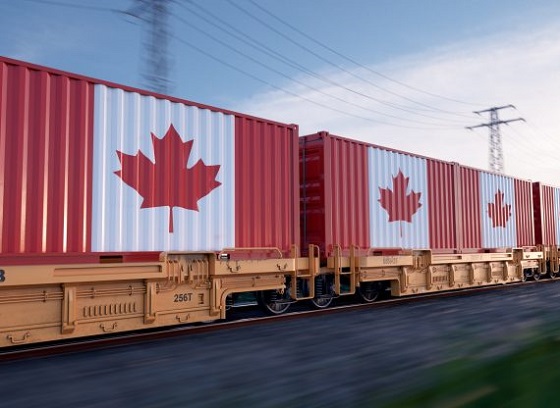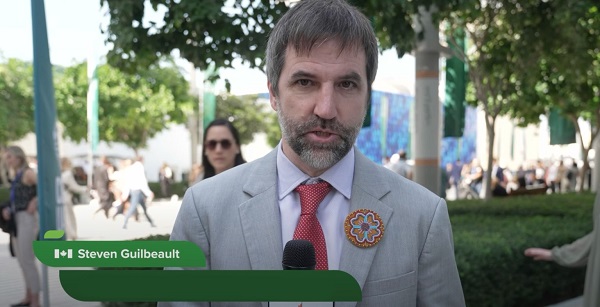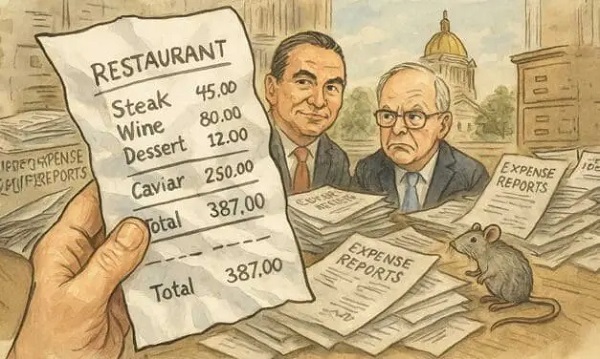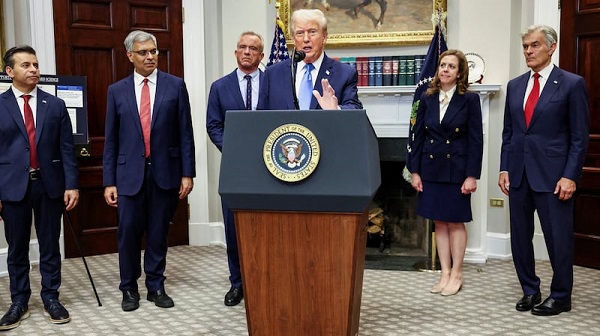Business
Removing barriers to trade between Alberta and the rest of Canada could grow our economy by $72.1 billion, says the MEI

If Alberta were to adopt a mutual recognition act with the rest of the country, similar to Nova Scotia’s, Canada’s economy would stand to grow significantly, according to a new Economic Note published by the Montreal Economic Institute.
“The growing momentum to eliminate internal barriers to trade in Canada is promising,” says the publication’s author, Trevor Tombe, professor of economics at the University of Calgary and senior fellow at the MEI. “If Alberta were to join the growing interprovincial free trade zone started by Nova Scotia, both it and Canada would be much more prosperous.”
Different regulations, certifications and testing requirements between provinces add costs, complexity and frustration to the process of selling goods and services across provincial boundaries. These many rules are commonly referred to as “interprovincial trade barriers.” Following U.S. President Donald Trump’s tariff threats, governments across Canada have identified the reduction of these barriers as a way to make the country’s economy more resilient.
Nova Scotia Premier Tim Houston was the first to recommend a model of mutual recognition of standards (without further testing or fees) and accelerated licensure of professional credentials with provinces that reciprocate. This would essentially render moot the vast majority of barriers
to interprovincial trade with provinces that adopt similar legislation. On March 26, 2025, Nova Scotia’s Free Trade and Mobility Within Canada Act received royal assent, becoming law in the province.
“The main benefit of mutual recognition policies is that they bypass the regulatory gridlock that has long plagued interprovincial trade discussions,” said Dr. Tombe. “It’s a trade first, harmonize later approach that allows Canadian consumers and businesses to begin to reap the benefits of these agreements without delay.”
Since then, Premiers Doug Ford and Rob Lantz, of Ontario and Prince Edward Island respectively, have tabled similar bills in their provinces.
So far, the Acts adopted and mutual recognition agreements signed are leading the way to internal free trade zones with the potential to boost the country’s economy substantially. The gains from free trade between Ontario and Nova Scotia alone, for example, could boost the Canadian economy by nearly $4.1 billion.
If Alberta were to adopt a similar bill to those of Nova Scotia, Ontario and Prince Edward Island, or sign mutual recognition agreements with all Canadian provinces, the country’s economy could grow by an estimated $72.1 billion.
Of particular interest, the signing of an agreement between Alberta and British Columbia alone would boost Canada’s GDP by an estimated $25.7 billion.
“Premier Danielle Smith should follow Nova Scotia Premier Tim Houston’s approach and adopt mutual recognition laws with the rest of the country,” said Dr. Tombe. “It’s one of the surest and lowest-cost ways for provincial governments to unleash Canadian productivity growth.”
* * *
The MEI is an independent public policy think tank with offices in Montreal, Ottawa, and Calgary. Through its publications, media appearances, and advisory services to policymakers, the MEI stimulates public policy debate and reforms based on sound economics and entrepreneurship.
Business
Bill C-8 would allow minister to secretly cut off phone, Internet service

From the Canadian Constitution Foundation
“I worry that this law could be used to secretly cut off political dissidents from their phone or Internet service on the pretense that they may try to manipulate the telecom system”
The Canadian Constitution Foundation is concerned about the civil liberties implications of the Carney government’s proposed cyber security bill, C-8, which would allow the minister of industry to secretly order telecommunications service providers like Telus, Bell and Rogers to stop providing services to individual Canadians.
The minister would be allowed to make such an order if she has “reasonable grounds to believe that it is necessary to do so to secure the Canadian telecommunications system against any threat, including that of interference, manipulation, disruption or degradation.”
An individual who does not comply, including by failing to keep the order secret, could face fines of up to $25,000 for the first contravention and $50,000 for subsequent contraventions. Businesses could face fines of up to $10 million for the first contravention and up to $15 million for subsequent contraventions.
The orders would remain secret indefinitely, with the minister required only to present an annual report to Parliament on the number of orders made and her opinion on their necessity, reasonableness and utility.
CCF Counsel Josh Dehaas said that the power to cut off the Internet or cellphone service of Canadians is a “very serious power that requires very strong safeguards, which are presently lacking in the bill.”
“While this power may be necessary in some cases to prevent cyber attacks, it also poses serious risks to civil liberties,” Dehaas said. “I worry that this law could be used to secretly cut off political dissidents from their phone or Internet service on the pretense that they may try to manipulate the telecom system,” Dehaas explained. “Such an action would violate our most cherished freedoms including free speech.”
CCF Litigation Director Christine Van Geyn said that the government cannot be trusted with such a power unless proper safeguards are in place.
“You may think that the idea of the government cutting off political dissidents from the necessities of life sounds far-fetched, but that’s exactly what happened during the 2022 Freedom Convoy protests in Ottawa,” she said. “The federal government ordered banks to freeze hundreds of bank accounts without any judicial authorization, cutting protesters off from their money in the middle of a very cold winter.”
“Although the Federal Court agreed with the CCF that freezing bank accounts this way violated the constitutional right to be secure against unreasonable searches and seizures, that kind of damage isn’t easily repaired,” Van Geyn added.
Ottawa has appealed the Federal Court’s finding. The CCF is awaiting a decision from the Federal Court of Appeal.
Dehaas said that Parliament should consider requiring either judicial pre-authorization or an immediate, automatic judicial review of any decision to cut off an individual or business from their Internet or phone.
The CCF is also concerned that Bill C-8 would allow the minister to weaken telecommunications companies’ encryption standards, allowing for unconstitutional access to Canadians’ private information.
Finally, the CCF is concerned that the bill could allow the minister or any person designated by the minister to engage in unconstitutional searches.
Joanna Baron, the CCF’s Executive Director, said that Canadians must be vigilant about their constitutional rights and freedoms because they can be easily taken away, especially in times of crisis.
“I would encourage Canadians to fight for their freedoms, whether it’s by taking the CCF’s free privacy course, signing up for our weekly Freedom Update newsletter or becoming a monthly donor,” Baron said.
“Concerned Canadians are also encouraged to write to their MPs using our form letter, to tell them to amend these bills to ensure Canadians’ rights to privacy and free expression are protected,” Baron added.
Alberta
Taxpayers: Alberta must scrap its industrial carbon tax

-
Carney praises carbon taxes on world stage
-
Alberta must block Carney’s industrial carbon tax
The Canadian Taxpayers Federation is calling on the government of Alberta to completely scrap its provincial industrial carbon tax.
“It’s baffling that Alberta is still clinging to its industrial carbon tax even though Saskatchewan has declared itself to be a carbon tax-free zone,” said Kris Sims, CTF Alberta Director. “Prime Minister Mark Carney is cooking up his new industrial carbon tax in Ottawa and Alberta needs to fight that head on.
“Alberta having its own industrial carbon tax invites Carney to barge through our door with his punishing industrial carbon tax.”
On Sept. 16, the Alberta government announced some changes to Alberta’s industrial carbon tax, but the tax remains in effect.
On Friday night at the Global Progress Action Summitt held in London, England, Carney praised carbon taxes while speaking onstage with British Prime Minister Keir Starmer.
“The direct carbon tax which had become a divisive issue, it was a textbook good policy, but a divisive issue,” Carney said.
During the federal election, Carney promised to remove the more visible consumer carbon tax and change it into a bigger hidden industrial carbon tax. He also announced plans to create “border adjustment mechanisms” on imports from countries that do not have national carbon taxes, also known as carbon tax tariffs.
“Carney’s ‘textbook good policy’ comments about carbon taxes shows his government is still cooking up a new industrial carbon tax and it’s also planning on imposing carbon tax tariffs,” Sims said. “Alberta should stand with Saskatchewan and obliterate all carbon taxes in our province, otherwise we are opening the door for Ottawa to keep kicking us.”
-

 Censorship Industrial Complex2 days ago
Censorship Industrial Complex2 days agoCanada To Revive Online Censorship Targeting “Harmful” Content, “Hate” Speech, and Deepfakes
-

 Business1 day ago
Business1 day agoTaxpayers deserve proof of how politicians spend their money
-

 Business1 day ago
Business1 day agoOttawa’s civil service needs a Chrétien-style reset
-

 International2 days ago
International2 days agoTrump, Netanyahu inch closer to peace plan for Gaza
-

 Alberta2 days ago
Alberta2 days agoAlberta refuses to take part in Canadian government’s gun buyback program
-

 Alberta2 days ago
Alberta2 days agoAlberta puts pressure on the federal government’s euthanasia regime
-

 Alberta2 days ago
Alberta2 days agoOrthodox church burns to the ground in another suspected arson in Alberta
-

 Fraser Institute1 day ago
Fraser Institute1 day agoAboriginal rights now more constitutionally powerful than any Charter right








